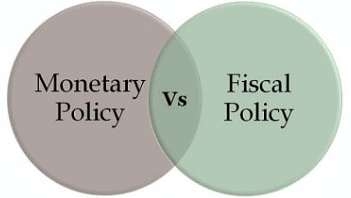UPSC Exam > UPSC Notes > Public Administration Optional for UPSC (Notes) > Role of Finance Ministry in Monetary and Fiscal Area
Role of Finance Ministry in Monetary and Fiscal Area | Public Administration Optional for UPSC (Notes) PDF Download
| Table of contents |

|
| Introduction |

|
| Role of the Finance Ministry in Fiscal Policy |

|
| Role of the Finance Ministry in Monetary Policy |

|
| Coordinating Monetary Policy: Challenges and Examples |

|
| Conclusion |

|
Introduction
The Ministry of Finance plays a vital role in the development planning of India, overseeing financial institutions and managing the country's overall financial landscape. With its three key departments, namely the Department of Economic Affairs, Department of Expenditure, and Department of Revenue, the Ministry of Finance assumes fiscal administration responsibilities. This article delves into the significant contributions of the Finance Ministry to both monetary and fiscal policy in India.
Role of the Finance Ministry in Fiscal Policy
- Under the umbrella of fiscal policy, the Ministry of Finance fulfills several critical functions. Its Department of Economic Affairs, through the Budget Division, prepares the government's budget. Moreover, the Finance Ministry exercises "Financial Control" through its Department of Expenditure, encompassing budget preparation, execution, and other miscellaneous matters.
- The Ministry scrutinizes proposals from spending departments to assess their financial implications. This scrutiny gives the Ministry leverage in shaping policies across various departments. While focusing on the overall financial impact and expenditure, the Ministry determines priorities in the national interest, ensuring a balanced distribution of funds among different services. By maintaining financial discipline and uniform standards, the Ministry of Finance acts as the backbone of development, financial stability, and good governance in India.

Role of the Finance Ministry in Monetary Policy
- Monetary Policy, managed by the central bank (Reserve Bank of India) in India, is crucial for maintaining price stability, reducing inflation, and achieving high economic growth. The Finance Ministry plays a significant role in shaping monetary policy through its interactions with the central bank. Monetary policy focuses on controlling the money supply and interest rates to stabilize the economy, while fiscal policy is more involved in development, infrastructure, and budgetary decisions.
- A sound monetary policy ensures that various sectors of the economy have sufficient authority to carry out transactions effectively. It provides the basis for fiscal policy and influences its direction. By adjusting interest rates, managing inflation, and maintaining a balance between demand and supply, monetary policy keeps the economy stable. The Finance Ministry's involvement in monetary policy is essential as it helps the government determine its fiscal policy, including revenue collection and expenditure.
Coordinating Monetary Policy: Challenges and Examples
- Conflicts between finance ministries and central banks are not uncommon worldwide, and India has experienced its fair share. Achieving effective coordination between these two institutions requires both art and science. The art lies in the ability of individuals to work together despite conflicting views, while the science is guided by institutional rules defining specific areas of responsibility.
- In the past, there have been instances of excellent coordination between the Finance Ministry and the Reserve Bank of India, even during challenging times such as double-digit inflation. However, more recent years have witnessed episodes of friction between these institutions, leading to strained relationships. The coordination between officials rather than high-level officials, such as the finance minister and the governor, has been more prevalent.
- Institutional coordination, though challenging, is crucial for economic stability. Disagreements are not necessarily detrimental as long as the legal provisions, granting independence to the monetary policy committee (MPC) to pursue the inflation target, are respected. However, the breakdown in communication poses a significant risk, particularly in the face of economic instability stemming from the banking sector.
Conclusion
- The Finance Ministry plays an indispensable role in shaping both monetary and fiscal policy in India. Through its fiscal administration responsibilities, it ensures financial discipline, uniform standards, and a balanced distribution of funds across various services. Additionally, the Ministry's involvement in monetary policy coordination with the central bank contributes to maintaining a stable economy, managing inflation, and supporting economic growth.
- As the Ministry of Finance continues to navigate its role in India's development planning, fostering effective coordination between institutions and nurturing the art and science of institutional collaboration remain essential for long-term economic stability and growth.
The document Role of Finance Ministry in Monetary and Fiscal Area | Public Administration Optional for UPSC (Notes) is a part of the UPSC Course Public Administration Optional for UPSC (Notes).
All you need of UPSC at this link: UPSC
|
58 videos|242 docs
|
Related Searches















